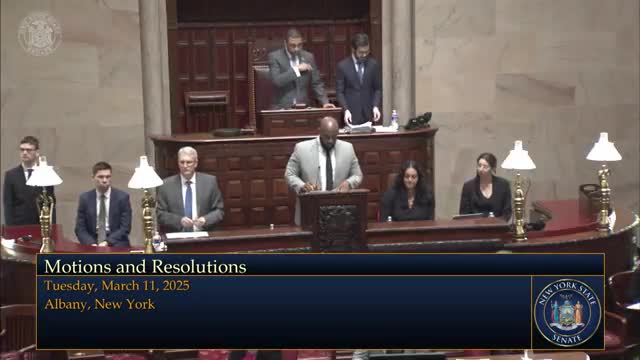Senate adopts resolution marking 60th anniversary of Bloody Sunday, speakers emphasize protecting voting rights
Get AI-powered insights, summaries, and transcripts
Subscribe
Summary
The New York State Senate on March 10 adopted Resolution 49, commemorating the 60th anniversary of Bloody Sunday. Speakers recalled John Lewis and urged continued work to protect voting rights following recent federal court decisions.
The New York State Senate adopted Resolution 49 on March 10 commemorating the 60th anniversary of Bloody Sunday and the Selma-to-Montgomery march, leaders said on the floor.
Sponsors and speakers framed the resolution as a reminder of the central role of voting rights in American democracy and noted recent federal court changes to voting-rights protections. Senator Gonzales delivered a floor statement that recounted the events on the Edmund Pettus Bridge in Selma, Alabama, on March 7, 1965, and quoted civil rights leader John Lewis. "We started walking," Gonzales read from Lewis's account, and later urged colleagues to "get in good trouble, necessary trouble, and help redeem the soul of America." The resolution, introduced in print by Senator Stuart Cousins, passed without recorded roll-call detail in the transcript; the presiding officer announced the resolution adopted.
Why it matters: Senators said the anniversary underscores ongoing threats to voter access and the importance of legislative protections. Gonzales contrasted the 1965 march with more recent protests and noted New York’s own election reforms, citing the state’s passage of the John R. Lewis Voting Rights Act and measures such as expanded early voting, ballot drop boxes, and same-day registration.
On the floor, Gonzales walked the chamber through the Selma march narrative — describing troopers' warnings, the attack on marchers and the subsequent escalation of public support that led to the Voting Rights Act’s passage months later. She said those events show "change does not come from on high but from ordinary people with extraordinary courage." The senator said that after recent U.S. Supreme Court rulings striking down portions of the federal Voting Rights Act, some states have enacted stricter ID requirements and closed polling places in minority neighborhoods, and she used the resolution to call for vigilance and continued local protections.
The resolution is commemorative; it does not create new law or regulatory obligations. The Senate adopted it following floor debate and a voice vote; the transcript records the presiding officer asking "All in favor… signify by saying aye," followed by "The resolution is adopted." No roll-call tally was recorded in the transcript for Resolution 49.
The chamber’s observance places the 1965 march in legislative context, with senators urging continued work on voting access and civic participation as part of honoring the civil-rights movement’s legacy.
